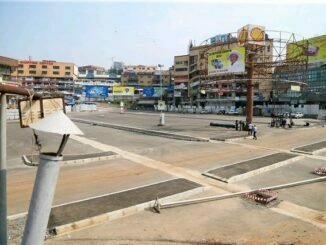
Kampala, Uganda | URN | The monumental Queen’s Clock previously installed at Katwe Clock Tower in Kampala cannot be traced, 11 years since it was removed for maintenance.
The missing clock was installed on the tower at the Nsambya-Entebbe road junction in the 1950s to commemorate the first visit of Queen Elizabeth II and the Duke of Edinburgh, Prince Philip to Uganda.
The queen visited Uganda as a British colony in 1954 to commission Owen Falls Dam in Jinja in eastern Uganda. For years, the tower stood tall as a valuable historical monument and a tourist site in the city with a unique bell that could sound at every top of the hour to the amazement of those who were visiting the town for the first time.
A source at Kampala Capital City Authority (KCCA), says that they discovered that the clock was missing when they started works on the Kampala flyover.
“It was an empty shell, the clock was not there and it’s difficult to tell where it is,” the source told our reporter.
Unofficial reports from within KCCA indicate that the clock disappeared in 2011 when the then newly established Kampala Capital City Authority (KCCA) under the stewardship of Jennifer Musisi embarked on a project to refurbish and rebrand the clock tower in an effort to “beautify the city.”
Our reporter has also established that a section of leaders from the city political wing reported to the police about the missing clock. The same matter came up on the floor of parliament in 2012, according to media reports. Members of Parliament then tasked the city authorities to reinstate the clock to its original state.
However, the matter concerning the clock went silent. Some KCCA officials were later quoted saying that the clock was taken to the national museum for safe custody and would be retrieved and reinstalled on the planned new tower, which is expected to be erected after the completion of the flyover project.
Our reporter visited the National Museum to trace the clock in vain. Rose Mwanja Nkaale, the commissioner for museums and monuments in the Ministry of Tourism, Wildlife and Antiquities, confirmed that the clock isn’t at the Kitante based National Museum along Kiira road. She added that for years they have tried to trace its whereabouts but their efforts are yet to bear fruit.
Nkaale noted that her office has since established that when KCCA removed the clock for maintenance in 2011, it was never reinstalled. The commissioner says that she has written to KCCA on numerous occasions demanding for the monumental clock to be returned but got no positive response.
“The clock apparently got lost at KCCA, we really need it because it would be the best that we could put on that new monument but up to today, we haven’t seen it. You know that monument was renovated by KCCA and they put those tiles, they were never there in the early years of Musisi. During that time the clock was removed, we tried to trace it but they said it was in our state,” Nkaale said.
Nkaale notes that on several occasions some officials, at KCCA, whom she didn’t disclose, informed her that they couldn’t locate the clock, which they had kept in their stores. At City Hall, the whereabouts of the historical clock has turned into a blame game of sort with several officials blaming each other.
“The clock was categorized as antiquity and the responsibility to preserve such lies with the Ministry of Tourism. So for us also we thought that the clock is with the museum. So I can’t point to which direction that clock is,” said Ronald Mubiru, the manager of Tourism at KCCA.
The Historical Monuments Act of 1967 mandates the ministry of Tourism, Wildlife and Antiquities to protect and preserve historical monuments in the country among other valuable items. URN tried to follow up on the police case, which was opened about the missing clock but officers could not trace the matter.
Asked whether police ever did an investigation into the matter, Kampala Metropolitan deputy police spokesperson, Luke Owoyesigyire noted that 2011 was “too long ago” for him to know exactly what happened then and give an answer. He referred us back to KCCA.
Simon Musaasizi, the communications manager at Cross-Cultural Foundation, an organization that has been at the helm of agitating for the preservation of monuments and historical sites in the country, says they don’t have information regarding the missing clock. He expressed dismay that such a monumental part of the historical tower could go missing.
Commissioner Nkaale says the ministry was only able to secure segments of the Clock Tower to be used when the 66-year-old structure was dismantled to pave way for the construction of the Kampala fly-over project.
Read Also: How Kampala’s Roads, Streets and Avenues get their names
“What we have are the segment obtained after the demolition of the entire tower…the segment preserved include, the metallic ladders that were in the tower, the door, the lightning rod and some bricks. I can confirm that those are securely preserved at the Uganda Museum,” said the commissioner.
She added that the plan is to reinstall these segments in the new tower, which is designed to stand high near the Pan African Square, a few meters from the position of the original clock tower.
The plan to re-establish a Clock Tower has been included in the Kampala fly-over project. Eng Lawrence Pario of Uganda National Roads Authority, notes that designs for the new Clock Tower are being developed with consideration of ensuring that the new structure will be a replica of the old one.
Pario says that in their plan, part of the original Clock Tower shall be included in the new tower, especially the metallic parts of the tower, including the top metallic section.



